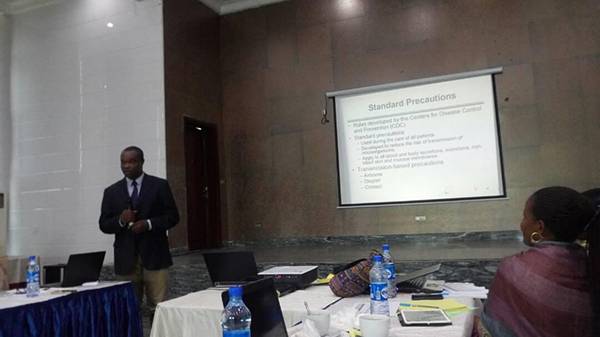You are here
Making an Investment in Infection Prevention and Control in Nigeria
Each day healthcare workers are on the front lines protecting people and saving lives. In doing their jobs, they come into contact with patients infected with dangerous pathogens, and those pathogens can be passed along to other patients and healthcare workers without proper infection prevention and control (IPC). Across the world, there are opportunities to develop and share best practices in IPC so healthcare workers can protect themselves and their patients.
Nigeria is Africa’s most populous country. During the past 18 months, public health professionals there have conducted comprehensive training in IPC practices. This training involved a collaboration between the Nigeria Field Epidemiology Training Program, the College of Medicine at the University of Lagos, Project HOPE and the U.S. Centers for Disease Control and Prevention (CDC), with funding provided by the CDC Foundation through generous support from Exxon Mobil.
This Nigeria Infection Prevention & Control Capacity Building Project is the first applied healthcare epidemiology and infection prevention and control training curriculum developed for public health professionals in Nigeria. The pilot of the curriculum was conducted in December 2016 with 34 residents from the Nigeria Field Epidemiology and Laboratory Training Program.
Not long after the pilot curriculum rolled out, it was put to the test at the Federal Medical Centre, Abeokuta, where an assistant chief nursing officer died on admission, subsequently testing positive for Lassa fever virus. This incident was investigated by a team of six residents who had just participated in the training and an official of the Nigeria Centre for Disease Control. Staff followed IPC procedures to prevent further transmission of Lassa fever among health workers at the medical center.
By using real time feedback from Nigerian public health professionals on the challenges of applying infection prevention and control practices during the Lassa virus outbreak, the pilot curriculum was adjusted to ensure it adequately addresses the complexity of outbreaks in the field.
A second training on basic healthcare epidemiology and infection prevention and control was held in May 2017. Nineteen participants attended the training with six facilitators. Participants were Nigeria Field Epidemiology and Laboratory Training Programme residents and graduates drawn from different healthcare fields and included clinicians, laboratory scientists, veterinarians from the Federal Ministry of Agriculture and medical doctors from the Federal Ministry of Health and Nigeria Centre for Disease Control, all of whom play a role in infection prevention and control.
As part of the program, national healthcare-associated infection protocols and tools have been developed for surgical site infections and catheter-associated urinary tract infections. These protocols and tools will provide data to inform interventions for prevention and control of healthcare-associated infections.
In addition, protocols and tools have been developed to address surgical site and urinary tract infections. The process to develop these tools and protocols was undertaken by a team of 19 Nigerian experts. A training workshop was also held on surveillance of surgical site infections for representatives of six teaching hospitals across Nigeria.
Also as part of this program, the first ever academic curriculum, designed for implementation in a university setting was developed and pilot tested for training of nurses on infection prevention and control. The College of Medicine at the University of Lagos undertook this project. In this work, a baseline assessment of infection prevention and control in selected hospitals in Lagos state was conducted to develop the curriculum and design related case studies. A broad group of stakeholders participated in these activities including Lagos state government, and medical directors of participating facilities.
To ensure a comprehensive approach, a curriculum development team and subject matter experts worked together to complete the curriculum consisting of 12 modules, including understanding disease transmission in health care settings and risk management and risk assessment. A train the trainers’ session was completed at the end of January 2018. Then, the first training was held during a two-week period in February and March. Twenty-two out of the 25 trainees—12 nurses, seven physicians and three laboratory scientists—met the requirements and received certifications of competency in infection prevention and control from the College of Medicine at Lagos.
After a formal close-out and certification meeting, we are pleased to report that the College of Medicine at the University of Lagos is adding infection prevention and control into its mainstream training curriculum for medical students. The curriculum has also been provided to the Nigeria Centre for Disease Control.
We at the CDC Foundation congratulate our partners in Nigeria and at CDC for this incredible program that will help to save and improve lives in Nigeria, and we thank Exxon Mobil for their support of this first-ever infection prevention and control program in Nigeria.
